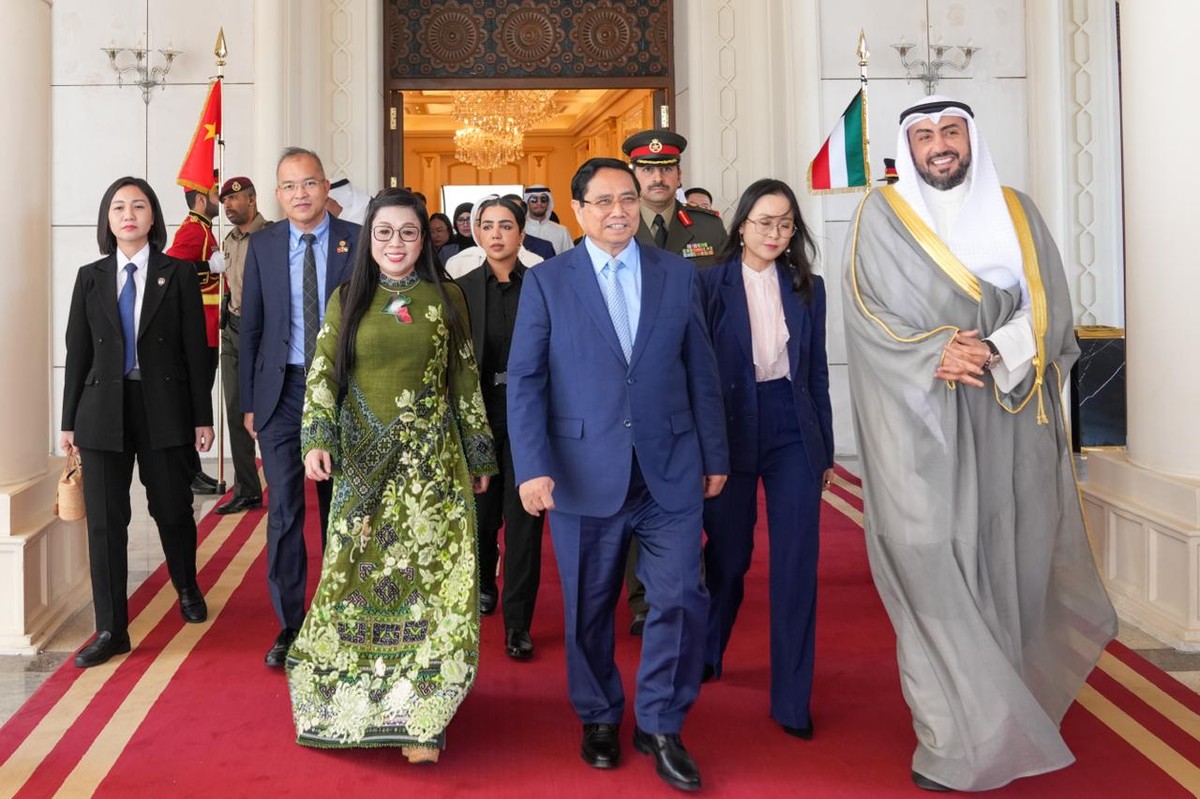18/11/2025
18/11/2025

The Prime Minister of the Socialist Republic of Vietnam Pham Minh Chinh and his spouse leave Kuwait after an official visit
KUWAIT CITY, Nov 18: Prime Minister of the Socialist Republic of Vietnam Pham Minh Chinh said the strategic partnership between Vietnam and Kuwait should not end with the signing of documents and statements, while affirming that his visit is an important milestone in the growing partnership between the two countries. Chinh and his accompanying delegation departed Kuwait on Tuesday after a three-day official visit. Advisor at the Prime Minister’s Office Sheikh Dr. Basel Al-Sabah headed the send-off party at Kuwait International Airport, including Minister of Social, Family and Childhood Affairs Dr. Amthal Al-Huwailah, Assistant Foreign Minister for Asian Affairs Ambassador Sameeh Jawhar Hayat, and Kuwaiti Ambassador to Vietnam Yousef Al-Sabbagh
The Vietnamese Prime Minister concluded his visit to Kuwait with a lecture at Saud Nasser Al-Sabah Diplomatic Institute entitled, “Vietnam’s Foreign Policy and its Vision for Vietnamese-Kuwaiti Relations.” He said that Kuwait was the first country in the Middle East to establish diplomatic relations with Vietnam on Jan 10, 1976, immediately after the country’s reunification and the restoration of its full independence, adding that Kuwait was also among the first countries to elevate its relations with Vietnam to a strategic partnership. He stated that last March, an agreement was reached to raise bilateral relations to a higher level, reflecting the depth of mutual trust and the aspirations of both sides for a closer future.
He expressed his happiness over the opportunity to be at the Institute, which he described as a prestigious academic and research institution that produced many of Kuwait’s diplomatic leaders. He affirmed his appreciation for the preservation of Kuwaiti architectural and cultural identity in the building, since its construction more than 80 years ago, making it a testament to the history and accumulated memory of generations of diplomats. He recalled the words of HH the late Amir Sheikh Sabah Al- Ahmad Al-Jaber, who affirmed in a speech that the peoples of the world, regardless of their religions, cultures and ethnicities, “share a common aspiration for peace, security and justice.” He stressed that these values remain a common ground uniting Kuwait and Vietnam up to this day, confirming that HH the late Amir’s directives contributed to Kuwait’s leaders focusing on Vietnam and strengthening relations at the time, as reflected in vital projects, such as Nghi Son Refinery in Vietnam and Kuwaiti funds’ investments in the Vietnamese economy.
He then talked about the shared vision for Vietnamese-Kuwaiti relations, stressing that history has proven that “when two nations share common values of peace, independence and development, geographical distance and cultural differences transform from potential obstacles into an added asset that strengthens the partnership.” He believes that Kuwait stands today at a “significant historical juncture”, which qualifies it to become a model of cooperation between Southeast Asian countries and the Arab world, and a vital bridge connecting Asia and the Middle East. Regarding Vietnamese-Kuwaiti relations, Chinh reiterated that the two countries share a common aspiration for peace, independence, and rapid and sustainable development. He said Vietnam and Kuwait stood by each other during the darkest periods of history, including the wars that both countries endured, and that the bitter experience of war has proven that “no one truly emerges victorious from war,” as its human, material and moral costs are exorbitant for everyone.
He thinks that shared values -- rejection of war, pursuit of development, and the commitment to sovereignty and independence -- made Hanoi and Kuwait closer and opened broader horizons for strengthening their partnership, particularly in the fields of energy, food security, investment, education, and scientific and technological cooperation. He pointed out that the world is going through a challenging period, and that “the more intense the crises, the greater the need for solidarity, and the greater the risks, the more cooperation and adherence to international rules become the only way to build a more peaceful, stable and prosperous world.” He expressed his confidence that Vietnam and Kuwait, through their strong ties, will continue to contribute to building this shared future.
He added the partnership between Vietnam and Kuwait should not stop at signing joint documents and statements, as it should transform into “a journey of trust, joint action and heartfelt connection,” beginning with cooperation between the two governments and official institutions, extending to universities and research centers, the business and investment sectors, and ultimately reaching the citizens of both countries.
He also highlighted the humanitarian role of Kuwait during the COVID-19 pandemic, disclosing that his country received 600,000 vaccine doses from Kuwait “completely free of charge.” He added “a single vaccine dose in those circumstances meant saving a life.” He asserted this gesture embodied a genuine partnership and sincere solidarity during a time of hardship. On the other hand, Assistant Foreign Minister for Institute Affairs Ambassador Nasser Al-Subaih confirmed that Vietnam and Kuwait share a deep-rooted friendship based on mutual respect, shared values, and a unified vision for achieving peace and prosperity.
He said “your visit to the Institute today is an important milestone in the growing partnership between our countries. We are deeply honored by your presence. Our countries have achieved remarkable developmental progress. This meeting provided us with a valuable opportunity to deepen our understanding of the foundations of Vietnamese foreign policy and explore new avenues for strengthening bilateral ties.” He added that Vietnam continues to play a crucial role on both the regional and international stages.
By Fares Ghaleb Al-Seyassah/Arab Times Staff and Agencies


